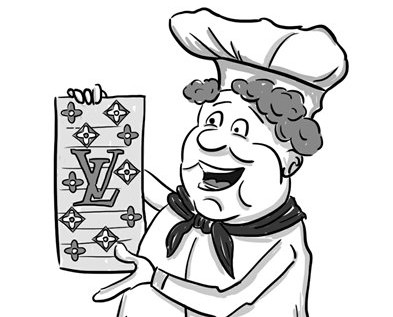

Illustration: Chen Xia/GT
The private equity arm of global luxury conglomerate LVMH, L Capital Asia, recently spent more than $100 million to acquire an "over 90 percent" stake in Singapore-based Chinese restaurant chain operator Crystal Jade Group.
This acquisition marks something a departure for L Capital Asia, which has a history of taking smaller stakes in its investments, according to information available on its official website. For LVMH as well, this marks the first time it has added Chinese restaurants to its portfolio of upscale assets. Such distinctions hint at the lofty ambitions riding on this deal - indeed, as L Capital Asia's managing director, Christina Teo, told the media recently, the fund hopes to expand the restaurant chain into markets across the Middle East, the US, Australia and India.
Crystal Jade is exactly the type of full-service mass-market restaurant that is now gaining traction in Asia, where increasing affluence is creating demand for new dining options and experiences. According to its website, the chain now owns and operates 113 outlets, with locations in Singapore, China, South Korea, Thailand and Japan. On the Chinese mainland, Crystal Jade currently operates 10 locations, including branches in popular leisure areas such as Shanghai's Xintiandi and Beijing's Shin Kong Place. Meals at these locations typically run around 150 yuan ($24) per person, still relatively high for many local people but within easy reach for middle- and upper-income diners going out for a special occasion.
But Crystal Jade isn't the only Asian restaurant chain which has gained attention from private equity groups this year. In February, China's Fosun Group reportedly invested over $33 million in Malaysia-based restaurant chain Secret Recipe, one of Southeast Asia's biggest restaurant chains and a roughly comparable peer of Crystal Jade. This investment comes as Secret Recipe expands its footprint across the mainland. Looking ahead, the chain hopes to operate a total of 100 outlets in the country by next year, by which point it believes the mainland market will account for more than 50 percent of its revenue, up from 10 percent now.
For the Chinese mainland specifically, such deals illustrate the new opportunities which are now emerging in the country's dining market. Many experts see huge potential in the mainland's full-service mass-market restaurant segment. Deals like those mentioned above support such views as new players enter the game.
Moreover, the central government's recent policies have struck a blow in favor of mass-market dining. On the mainland, the government's ongoing anti-graft and anti-extravagance campaigns have reined in official spending on luxury meals and over-the-top banquets. This has made the industry more rational and shifted attention and resources toward the needs of ordinary diners. Indeed, in the China Cuisine Association's annual report for 2013, revenues at high-end restaurants contracted by 1.8 percent following the government's clampdown. To keep their doors open, many restaurants which previously relied on profligate officials had to redesign their menus and lower their prices to generate more mass appeal. One good case on this point is Beijing Xiangeqing Co Ltd, which suffered a 564 million yuan loss last year, forcing its owners to abandon the high-end segment. Conversely, L Capital Asia's Teo said that rather than being affected by the campaign, Crystal Jade has been growing by an annual rate of 20 percent on the mainland.
Mounting concerns about food safety on the mainland have also given a boost to dining brands with reputable overseas backgrounds. At the same time, the country's deepening love for e-commerce, an infatuation which has already had a tremendous impact on many traditional consumer habits, has hardly made a dent in restaurant spending.
Until recently, most of L Capital Asia's investments, according to its website, have been in Asia's "masstige" - or luxury for the masses - segment. In 2010, for instance, the company acquired a 20 percent stake in Singaporean shoe and accessory brand Charles & Keith for over $30 million, a tie-up which has since helped the label open more than 40 outlets on the mainland. Considering the successful expansion of Charles & Keith, we can perhaps look forward to more Crystal Jade outlets on the mainland and other parts of the world as its new stakeholder leverages LVMH's marketing and branding expertise.
Copyright ©1999-2018
Chinanews.com. All rights reserved.
Reproduction in whole or in part without permission is prohibited.